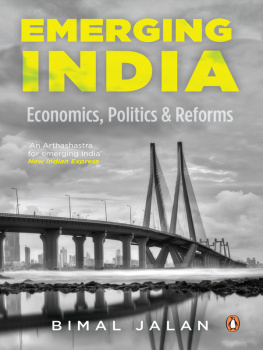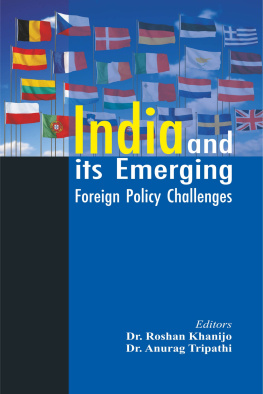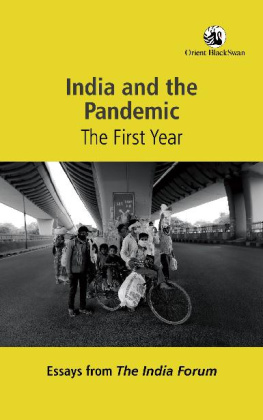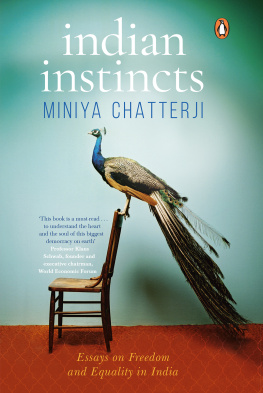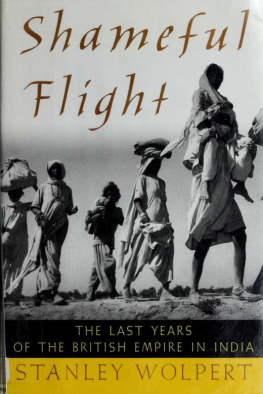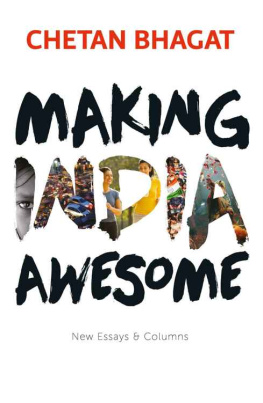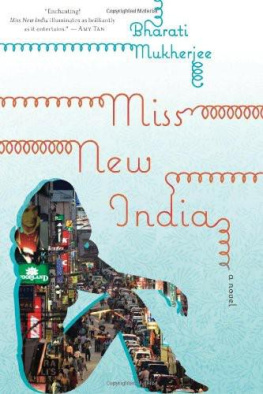You cannot miss this flight : essays on emerging India
Here you can read online You cannot miss this flight : essays on emerging India full text of the book (entire story) in english for free. Download pdf and epub, get meaning, cover and reviews about this ebook. year: 2017, genre: Politics. Description of the work, (preface) as well as reviews are available. Best literature library LitArk.com created for fans of good reading and offers a wide selection of genres:
Romance novel
Science fiction
Adventure
Detective
Science
History
Home and family
Prose
Art
Politics
Computer
Non-fiction
Religion
Business
Children
Humor
Choose a favorite category and find really read worthwhile books. Enjoy immersion in the world of imagination, feel the emotions of the characters or learn something new for yourself, make an fascinating discovery.

You cannot miss this flight : essays on emerging India: summary, description and annotation
We offer to read an annotation, description, summary or preface (depends on what the author of the book "You cannot miss this flight : essays on emerging India" wrote himself). If you haven't found the necessary information about the book — write in the comments, we will try to find it.
Unknown: author's other books
Who wrote You cannot miss this flight : essays on emerging India? Find out the surname, the name of the author of the book and a list of all author's works by series.
You cannot miss this flight : essays on emerging India — read online for free the complete book (whole text) full work
Below is the text of the book, divided by pages. System saving the place of the last page read, allows you to conveniently read the book "You cannot miss this flight : essays on emerging India" online for free, without having to search again every time where you left off. Put a bookmark, and you can go to the page where you finished reading at any time.
Font size:
Interval:
Bookmark:
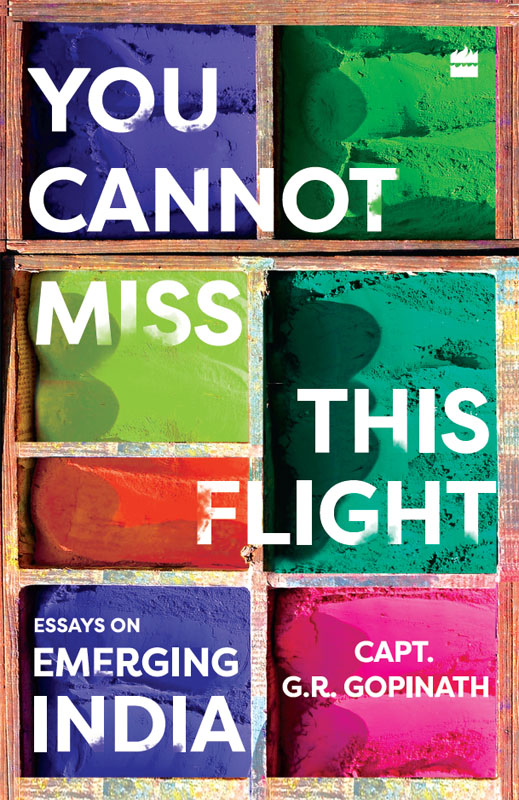
YOU CANNOT MISS
THIS FLIGHT
Essays on Emerging India
CAPTAIN G.R. GOPINATH
Foreword by
Lord Meghnad Desai

To my mother,
who by her silent grace taught me generosity and tolerance
Contents
The Captains Lead
C aptain Gopinath is associated with a path-breaking innovation in Indian lives. His Deccan Air was the pioneer in the no-frills airline business. But what we learn from reading this marvellous collection of essays is that he is not just an entrepreneur (in the original sense of the term) but also a political maverick. He is a liberal. That is a category of politician unknown in India. A real liberal trusts individual initiative more than collective action the Market more than the State.
During the sixties, we had the Swatantra Party which tried to establish a liberal party, but even many of its members could not understand that a liberal was not a conservative but a radical. In India, radicalism is identified with various sects of Leninism, all of which are against freedom. There is too much trust in the State. The liberal mistrusts this idea. There is no abstract neutral State. There are only governments run by politicians and bureaucrats.
These essays take us through the practical entrepreneur who built a great airline, sold it to Vijay Mallya and lived to regret it. It is a well-known story, but even so it is good to read his own version. We also see a concerned Indian, who is worried about the corruption, the bureaucracy and the inefficiency of the country he loves. As a liberal, he is aware that he is in a tiny minority who disbelieve the governments ability to solve all problems. He has experienced at first hand the obstacles bureaucrats put in the path of an entrepreneur. He knows it will take a lot to change the system.
As an individual and an individualist, Captain reveals fascinating sides of himself. His growing up in a village in Karnataka, his experience in the Army, his epiphany which led him to start an airline as a way of providing millions of Indians with reasonably priced travel and his political activism joining the AAP and leaving it make for a captivating mix of the serious and the amusing.
Then there is his lasting interest in sponsoring young entrepreneurs. The essay The Vadhyar Who Wrote His Own Horoscope is a gem as it reveals the Captains insight into what makes entrepreneurs. As he says, India will have a bright future if it has great entrepreneurs.
Let us then salute this great Indian entrepreneur, politically engaged individual and nourisher of the next generation of entrepreneurs.
You cannot miss reading this wonderful book!
Lord Meghnad Desai
27 April 2017
Let me light my lamp, says the star, and never debate if it will help remove the darkness.
(Rabindranath Tagore in Fireflies )
T his collection of essays from my published writings cover a wide range of topics economy, politics, farming, agriculture, defence, social issues and my personal life experiences. They are views of a lay person and theres no pretence to scholarship. Ive no scholastic achievements. I grew up in a village, and my life has been tossed about like a tiny boat on the high seas during all its storms and gales.
I spent eight years in the Army, fought in the 1971 Bangladesh War, farmed a remote and barren piece of shrub land, after prematurely retiring from the Army, and then embarked on various odd enterprises from running a motorcycle dealership to an Udupi hotel in small rural towns of Karnataka. Later, I launched with my Army pilot buddies Indias first dedicated helicopter company, followed by the low-cost airline Air Deccan.
Along the way, I contested elections twice once from a mainstream political party which is now ruling the country, for the state elections from a rural constituency; and as an Independent for the Parliament from Bangalore and lost both times. In a sense, its been a life on the edge of chaos. Blessed with a fount of inextinguishable optimism and a wild courage, which got me into trouble and also out of it, I plunged headlong into the sea of life, in a country that has remained an enigma. It sapped my energies and yet nourished me.
I wrote these essays in the last few years, deeply conscious, as Emerson said, that we are all victims and, at the same time, a source of injustice, with a perspective gained from all my follies and journeys, as the country went through tumultuous changes.
W hen I look back at the days just before I founded Air Deccan, a few images come to my mind. Images of Indias transformation from a nation with a billion mouths to feed to one of a billion consumers; from a nation with two government-run television channels to one whose countryside was dotted with shiny dish antennae. I had a birds-eye view of this wave of change from the cockpit of the charter helicopter service I used to run in those days.
It was in this atmosphere of feverish change that the idea of Air Deccan came to me. Chandrababu Naidu asked me to start a daily flight from Hyderabad to Vijayawada and Rajahmundry, instead of the on-demand helicopter service I ran. Several politicians in Karnataka who availed my charter service began to ask why I wasnt starting a regular service to tier-III cities like Hubli and Belgaum.
However, the first time that the idea of starting a low-cost airline came to me with clarity was thousands of miles away from home.
I was strolling around in the lounge of the Phoenix airport in the US when I saw a plaque that announced that the airport handled 1,000 flights and 1,00,000 passengers a day. An airport that was in the middle of a desert handled more flights than all the airports in India put together. Later, on the Southwest (an American low-cost carrier), I was seated next to a beefy man who was chewing on a burger. He turned out to be a carpenter.
13 million vs 16 million
It was a moment of epiphany, one that led to the birth of Air Deccan and low-cost aviation in India. Consider this: At that time, Indias carriers Jet Airways, Sahara and Indian were running at 55 per cent capacity, carrying around 13 million passengers a year. Yet, over 16 million people travelled by trains every day. It stood to reason that most of these people could not afford to fly. And that was Air Deccans dream: to provide a service that would allow millions of middle-class folks to fly. It would also connect the hitherto unconnected, smaller cities where the winds of change had been blowing at a pace like never before.
We launched Air Deccan with one old, used ATR aircraft on lease; no one believed in my dream or was ready to fund the airline. But once we were up and running and caught the public imagination, we raised capital and managed to deploy forty-five aircraft in forty-five months and overtook Indian in market share. A new India was flying. In four years, we were connecting sixty-nine cities daily, when some of our larger competitors were operating flights to forty-odd cities. Of these sixty-nine cities, close to thirty were first-time destinations.
But as we grew, so did the competition. Oil prices went through the roof. We had 4,000 employees. At an AGM, a shareholder told me that he had put his savings into buying stocks of our airline and expressed hope that it would be worth it. It was an obligation that really haunted me.
Mallyas money
When the deal with Kingfisher happened, the understanding was that Kingfisher and Deccan would be run as separate brands. People might progress from one service to the other but, in my mind, there was space and demand for both. You need both an Udupi hotel and an Oberoi hotel. Also, I believed that there could be tremendous back-end synergy.
Font size:
Interval:
Bookmark:
Similar books «You cannot miss this flight : essays on emerging India»
Look at similar books to You cannot miss this flight : essays on emerging India. We have selected literature similar in name and meaning in the hope of providing readers with more options to find new, interesting, not yet read works.
Discussion, reviews of the book You cannot miss this flight : essays on emerging India and just readers' own opinions. Leave your comments, write what you think about the work, its meaning or the main characters. Specify what exactly you liked and what you didn't like, and why you think so.


